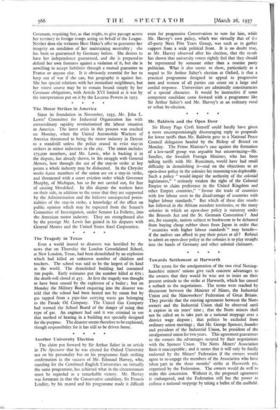Mr. Baldwin and the Open Door Sir Henry Page Croft
himself could hardly have given a more uncompromisingly discouraging reply to proposals for lower tariffs than Mr. Baldwin gave to a National Peace Council delegation headed by the Bishop of Bristol on Monday. The Prime Minister's case against the formation of a low-tariff group was arguable but unconvincing—Hr. Sandler, the Swedish Foreign Minister, who has been talking tariffs with M. Runciman, would have had small difficulty in demolishing it—and on the objections to an open-door policy in the colonies his reasoning was deplorable. Such a policy " would impair the authority of the colonial legislatures," " seriously weaken the right of the Colonial Empire to claim preference in the United Kingdom and other Empire countries," " favour the trade of countries with low labour costs to the disadvantage of countries with higher labour standards." But which of these dire results has followed in the African mandate territories, or the many colonies in which an open-door policy is statutory under the Brussels Act and the St. Germain Convention ? And are, for example, natives subject to hookworm to be debarred from buying cheap rubber shoes from Japan in order that " countries with higher labour standards " may benefit— if the natives can afford to pay their prices at all ? Refusal to admit an open-door policy in the colonies is to play straight into the hands of Germany and other colonial claimants.










































 Previous page
Previous page